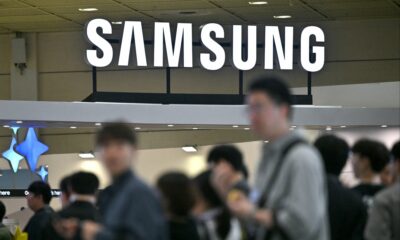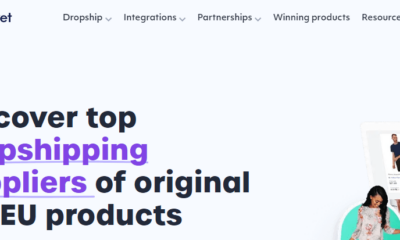SOCIAL
Meta Announces ‘Recurring Notifications’ for Business Messaging, a Significant Shift in its Platform Approach
This is an unusual switch up in Meta’s business messaging rules.
This week, at its first-ever ‘Conversations’ messaging conference, Meta announced ‘Recurring Notifications’ on its Messenger Platform, which will enable businesses to send ‘proactive, automated messages, to people who have opted in to receiving them’.
As you can see here, businesses will soon be able to send recurring notifications to users that opt in, with the upfront prompts outlining the frequency of messages that they’ll likely receive if they choose to get them.
Businesses will be able to send sales notifications, updates, newsletters – pretty much whatever they like, with the frequency options ranging from daily to monthly, ‘so businesses can reach customers at any moment in their journey’.
Which is pretty much the exact opposite of how Meta has run its messaging platform this far, with strict limits on how many times a business can message users, even if they’ve opted in.
As explained by Hootsuite:
“Businesses can only contact someone after receiving a message from them first. Once you’ve received a message, you have 24 hours to reply. After that, Facebook used to let businesses send one message. But as of March 4th, 2020, that option will be gone. Beyond that, the only remaining option is to send a Sponsored Message. These ads can only be sent to existing conversations.”
Indeed, in Meta’s Messenger Platform and IG Messaging API Policy Overview, it explains that:
“Businesses will have up to 24 hours to respond to a user. Messages sent within the 24 hour window may contain promotional content.”
Brands can then use its ‘One-time Notification’, which enables businesses to send one follow-up message after the 24-hour messaging window has ended. But Meta has been very careful about allowing businesses to potentially overuse its messaging API, for fear of them spamming their device to notifications hell, through random promotions and alerts that could quickly become very annoying.
It seems that Meta is no longer as concerned about this, and with users having to opt in, with a clear overview of how many messages they can expect if they do, that looks like it’s now enough for Meta to be fine with letting brands unleash in your DMs, if you allow them.
And there’s good reason for this – money.
“Recurring Notifications is a new, optional premium feature that we intend to charge businesses for in the future. It is currently available to all businesses using Messenger Platform as part of a free trial period. We currently charge businesses to send messages from the WhatsApp Business API and we’re listening to customer feedback to guide decisions on our pricing model.”
After struggling to find an adequate means to monetize its messaging platforms, Meta seems to have settled on charging businesses to use its messaging tools – though when it will start charging, and how much it will cost to use such, is still not clear.
Meta’s keeping this all in-house for now, in the hopes that brands will start using these new business messaging features, and build a reliance on them, before it brings in costs. Once businesses are getting results from these features, it will be harder for them to say no, and Meta could bring in a lot more revenue from its messaging platforms, very quickly.
This is a key focus for developing markets, where WhatsApp, in particular, is already a key connection platform. If Meta can get more businesses even more reliant on WhatsApp, with new business tools like this, and its new WhatsApp Cloud API, that will bring in a whole new range of brands that will need to keep paying Meta to support their business initiatives.
Meta’s keeping the timing under wraps because it doesn’t know when it will see optimal take-up of these new options, but it likely has a threshold in place for when it pushes the button and rolls out charges for the various elements.
It’s the old honey trap technique – lure businesses in with offerings they can’t refuse, then increase the costs, when they’re already stuck in the trap.
And it could work, with these new options providing valuable functionality that will help many businesses build on its messaging platforms.
But it’s interesting to note the shift in ethos here, and how Meta will bend its own rules if it sees benefit.
SOCIAL
Snapchat Explores New Messaging Retention Feature: A Game-Changer or Risky Move?

In a recent announcement, Snapchat revealed a groundbreaking update that challenges its traditional design ethos. The platform is experimenting with an option that allows users to defy the 24-hour auto-delete rule, a feature synonymous with Snapchat’s ephemeral messaging model.
The proposed change aims to introduce a “Never delete” option in messaging retention settings, aligning Snapchat more closely with conventional messaging apps. While this move may blur Snapchat’s distinctive selling point, Snap appears convinced of its necessity.
According to Snap, the decision stems from user feedback and a commitment to innovation based on user needs. The company aims to provide greater flexibility and control over conversations, catering to the preferences of its community.
Currently undergoing trials in select markets, the new feature empowers users to adjust retention settings on a conversation-by-conversation basis. Flexibility remains paramount, with participants able to modify settings within chats and receive in-chat notifications to ensure transparency.
Snapchat underscores that the default auto-delete feature will persist, reinforcing its design philosophy centered on ephemerality. However, with the app gaining traction as a primary messaging platform, the option offers users a means to preserve longer chat histories.
The update marks a pivotal moment for Snapchat, renowned for its disappearing message premise, especially popular among younger demographics. Retaining this focus has been pivotal to Snapchat’s identity, but the shift suggests a broader strategy aimed at diversifying its user base.
This strategy may appeal particularly to older demographics, potentially extending Snapchat’s relevance as users age. By emulating features of conventional messaging platforms, Snapchat seeks to enhance its appeal and broaden its reach.
Yet, the introduction of message retention poses questions about Snapchat’s uniqueness. While addressing user demands, the risk of diluting Snapchat’s distinctiveness looms large.
As Snapchat ventures into uncharted territory, the outcome of this experiment remains uncertain. Will message retention propel Snapchat to new heights, or will it compromise the platform’s uniqueness?
Only time will tell.
SOCIAL
Catering to specific audience boosts your business, says accountant turned coach

While it is tempting to try to appeal to a broad audience, the founder of alcohol-free coaching service Just the Tonic, Sandra Parker, believes the best thing you can do for your business is focus on your niche. Here’s how she did just that.
When running a business, reaching out to as many clients as possible can be tempting. But it also risks making your marketing “too generic,” warns Sandra Parker, the founder of Just The Tonic Coaching.
“From the very start of my business, I knew exactly who I could help and who I couldn’t,” Parker told My Biggest Lessons.
Parker struggled with alcohol dependence as a young professional. Today, her business targets high-achieving individuals who face challenges similar to those she had early in her career.
“I understand their frustrations, I understand their fears, and I understand their coping mechanisms and the stories they’re telling themselves,” Parker said. “Because of that, I’m able to market very effectively, to speak in a language that they understand, and am able to reach them.”Â
“I believe that it’s really important that you know exactly who your customer or your client is, and you target them, and you resist the temptation to make your marketing too generic to try and reach everyone,” she explained.
“If you speak specifically to your target clients, you will reach them, and I believe that’s the way that you’re going to be more successful.
Watch the video for more of Sandra Parker’s biggest lessons.
SOCIAL
Instagram Tests Live-Stream Games to Enhance Engagement

Instagram’s testing out some new options to help spice up your live-streams in the app, with some live broadcasters now able to select a game that they can play with viewers in-stream.
As you can see in these example screens, posted by Ahmed Ghanem, some creators now have the option to play either “This or That”, a question and answer prompt that you can share with your viewers, or “Trivia”, to generate more engagement within your IG live-streams.
That could be a simple way to spark more conversation and interaction, which could then lead into further engagement opportunities from your live audience.
Meta’s been exploring more ways to make live-streaming a bigger consideration for IG creators, with a view to live-streams potentially catching on with more users.
That includes the gradual expansion of its “Stars” live-stream donation program, giving more creators in more regions a means to accept donations from live-stream viewers, while back in December, Instagram also added some new options to make it easier to go live using third-party tools via desktop PCs.
Live streaming has been a major shift in China, where shopping live-streams, in particular, have led to massive opportunities for streaming platforms. They haven’t caught on in the same way in Western regions, but as TikTok and YouTube look to push live-stream adoption, there is still a chance that they will become a much bigger element in future.
Which is why IG is also trying to stay in touch, and add more ways for its creators to engage via streams. Live-stream games is another element within this, which could make this a better community-building, and potentially sales-driving option.
We’ve asked Instagram for more information on this test, and we’ll update this post if/when we hear back.
-

 SEARCHENGINES6 days ago
SEARCHENGINES6 days agoGoogle Core Update Volatility, Helpful Content Update Gone, Dangerous Google Search Results & Google Ads Confusion
-

 SEO6 days ago
SEO6 days ago10 Paid Search & PPC Planning Best Practices
-

 MARKETING7 days ago
MARKETING7 days ago2 Ways to Take Back the Power in Your Business: Part 2
-

 MARKETING5 days ago
MARKETING5 days ago5 Psychological Tactics to Write Better Emails
-

 SEARCHENGINES5 days ago
SEARCHENGINES5 days agoWeekend Google Core Ranking Volatility
-

 PPC7 days ago
PPC7 days agoCritical Display Error in Brand Safety Metrics On Twitter/X Corrected
-

 MARKETING6 days ago
MARKETING6 days agoThe power of program management in martech
-
SEARCHENGINES4 days ago
Daily Search Forum Recap: April 15, 2024













You must be logged in to post a comment Login